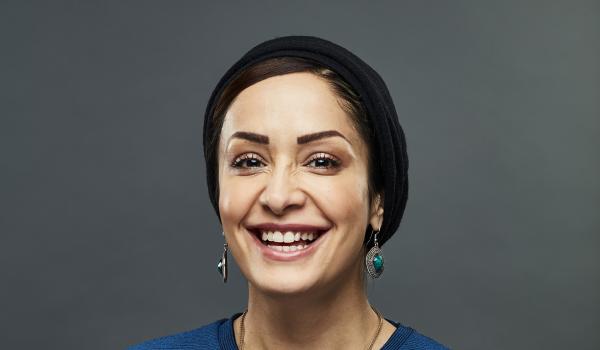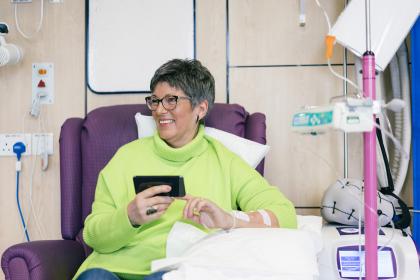For Zahra, working in ovarian cancer research is more than just a job. Here she talks about research breakthroughs, the importance of funding, and the driving force behind her mission to improve the outcomes for women living with ovarian cancer…
I lost my mum to ovarian cancer. It's devastating to watch somebody go through it. It's absolutely devastating. I think the fact that I was so involved in ovarian cancer research helped – even though it was quite hard to be on the ovarian cancer scene all the time.
Before she passed away, mum said to me, "I want you to make a difference." Now I can feel her spurring me on, clapping her hands and telling me to hurry up and see if I can help anybody else in her situation.
Mum
My mum Farzaneh was going through ovarian cancer while I was researching DNA damage and response in ovarian cancer.
Like a lot of women with ovarian cancer, things started with bloating and back pain. This had been going on for a while, but she'd ignored it because she was 50 and put it down to menopause. After she was sent in for surgery, they very quickly diagnosed her with advanced ovarian cancer (stage IIIb).
Initially she responded very well to chemotherapy. When I fell pregnant she came to stay with me. A few weeks after I gave birth we found out that the ovarian cancer had come back. Mum had a brilliant surgeon and a fantastic medical oncologist who looked after her. When she was first diagnosed they gave her all the options that were available. She also had fantastic nurses and a great support system. What was lacking was the treatment once she'd relapsed. She became allergic to the platinum chemotherapy that they were giving her, and once she became resistant to the other drugs she had no other choices. She deteriorated quite quickly after that.
Motivation
I think that my mum being diagnosed with cancer kind of interlinked with my research. I couldn't separate the two because I was working on the same thing that she was diagnosed with. Throughout her diagnosis and treatment, her relapse and then finally her death, I was hopeful because of the research that I was doing. It made feel like I was supporting her emotionally, while keeping the hope alive through finding some form of new treatment or early diagnostic test.
Cancers like ovarian cancer, which are often diagnosed at a later stage, are the ones that we need to be funding more. Cutting funding doesn't directly affect the person who has cancer, but it is going to affect families and generations to come. We have to be thinking about our children and our children's children. The more we can raise, and the less we cut funding, the more of an investment we make in our children's futures.
Finding new treatments
After mum died, I became an advocate for personalised medicine and screening tests for early diagnosis. I think having personalised therapy – finding drugs and treatments that are specific to the person and the type of ovarian cancer they have – is so important. By doing that, we can making quality of life better in terms of the drugs we're using. I think that's key to ovarian cancer.
I think there is hope in ovarian cancer – through research and funding we've actually been able to prolong lives and improve the quality of life of women with ovarian cancer. If it wasn't for my mum's fantastic surgeon, or the amazing staff and drugs that were available, she wouldn't even have had the time that she had. In the end in my mum ran out of treatment options. I want to change that for other women. There's so much more room for improvement – that's the real hope. We need more investment in ovarian cancer research now.
Together, we can create a world where no one has to say goodbye too soon to someone they love because of ovarian cancer. It's time to TAKE OVAR.
If you’ve been affected by this story and would like to speak to a specialist nurse, you can call our dedicated support line on 020 7923 5475 or contact us: [email protected]. We're open from 9am until 5.30pm, Monday to Friday.





